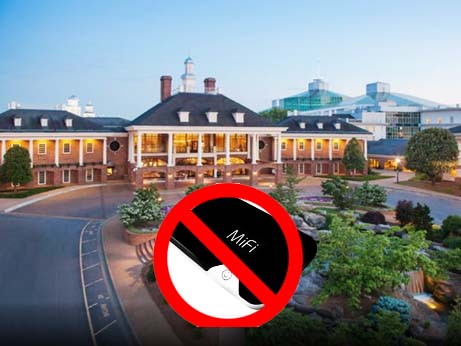
IndiaTechOnline Special
By AnandParthasarathy
October 26 2014: A hotel in the US, has been fined $ 600,000 ( Rs 3.6 crores) for disabling "WiFi networks established by consumers in the conference facilities" of the property.
The fine was ordered by the Federal Communications Commission ( the telecom regulatory body of the US government) in an order issued earlier this month after a guest at the Gaylord Opryland hotel in Nashville, Tennessee complained that the hotel ""jamming mobile hotspots so you can’t use them in the convention space."
The technology news site, ArsTechnica.com reports that the hotel admitted that "one or more of its employees used containment features of a Wi-Fi monitoring system at the Gaylord Opryland to prevent consumers from connecting to the Internet via their own personal Wi-Fi networks."
The FCC has decided that hotels jamming or preventing the private WiFi networks of their guests was in violation of one of its own advisories that forbids blocking, jamming, or interference with authorized radio communications, including Wi-Fi.
The hotel, part of the Marriot chain, however defended its action in a response to Ars Technica which were meant to ensure that " when our guests use our Wi-Fi service, they will be protected from rogue wireless hotspots that can cause degraded service, insidious cyber-attacks and identity theft."
The incident should serve as a wakeup call to the Indian hospitality industry as well as an alert to India's own Telecom Regulatory Authority, TRAI to address the issue of guest access to Internet in hotels.
While hospitality industry surveys have overwhelmingly suggested that providing free broadband or wireless Internet access in hotels and resorts is the sensible thing to do in this Connected Era, the majority of establishments worldwide either don't provide Internet access or charge for it at rates most customers would perceive to be extortionate -- considering the real cost of the service.
Our brief surveys show that in India hotels typically charge between Rs 250 and Rs 1000 ( including service tax) for 24 hours of unlimited WiFi or wired Internet access.
Just as guests these days rarely pay the stiff charges of hotel assisted telephone calls, preferring to use their own mobile phones, many also carry the increasingly ubiquitous, mobile WiFi hotspot devices, which allow them to use their 3 G SIMs to create a temporary WiFi hotspot within their rooms. The additional cost of such devices is only Rs 2000 or less.
------------------------------------------------------------------------------------------------------
See our story on portable, personal WiFi or MIFI: WiFi hotspot on the hoof
------------------------------------------------------------------------------------------------------
It must be pointed out in fairness to the Marriot hotel in the FCC case, that their objections seem directed at a guest creating a hotspot in a relatively public spot like the hotel's convention centre and not in his or her own room. Event managers everywhere including India, are accustomed to providing hotel- wide WiFi for delegates during conferences or conventions. It is usually the hotel that provides the connectivity at a charge.
It is clear from the Tennessee incident that event organisers who bring in significant revenue to hotels by way of MICE bookings are increasingly reluctant to pay the stiff charges that hotels levy for conference WiFi -- especially when the alternative is easy to set up and portable, with no permanent fixtures.
Hotels need to consider whether it is better to join 'em rather than fight 'em -- where 'them' means WiFi technologies that are getting cheape and easier to access with every passing day. If hotels accepted smaller returns, and offered more reasonably priced WiFi access, event organisers will have no motivation to set up their own ad hoc WiFi networks.
Because, let's concede, the fears expressed by the Marriot spokesperson are not unreal -- if hotels turn into a jungle of unregulated, anonymous WiFi clouds -- sooner or later, some Net baddies are going to smell an opportunity for serious damage.
Meanwhile the best solution may be to increasingly see WiFi as a means to gain guest loyalty -- as a Kerala, hotel chain, Abad, has done. See our story